يحاول ذهب - حر
IIoT, Cyber Security & Instrumentation - A Step Towards The Future
June 2018
|Chemical Engineering World
The advent of information technology has changed the way we work, with a number of smart gadgets continuously connected to the internet. These gadgets are the ‘things’ referred to in the term ‘Internet of Things’ (IoT). When extended to manufacturing and production industries, this is known as the ‘Industrial Internet of Things’ (IIoT). The ‘things’ in IIoT are intelligent machines that share data using advanced communication technologies for more reliable, efficient and safe operation of the plant. Most of the devices are hooked to the network allowing instantaneous monitoring and control. IIoT has the potential to unleash benefits by providing information to be used in increasing plant availability, resulting in operating the process plant near the threshold design parameters and minimizing downtime. While technology is no longer a constraint, the means of implementing it for use in industry seems challenging.

The industrial internet of things (IIoT) is currently a trending topic in the process and automation industry. This technology has the potential to provide the industry with knowledge of the hidden parameters which have always existed in plants but remained unutilized due to a lack of analytical processes. This article intends to focus on the fundamentals of IIoT, its implementation and challenges.
OT, IT and IIoT in the Process Industry
The connection of all process parameters in a plant to the control system forms the backbone of operation technology (OT). Implementing OT capabilities on ethernet, LAN or WAN to share this plant information for further optimization formalizes the concept of information technology (IT) for the industry.
IIoT is a combination of OT and IT, bringing the process parameter information to a common platform to share relevant data with relevant systems in real time. In the process industry, these vary from the data of known tagged plant devices to information from untagged sensors which is available but remains unutilized.
The innovation in hardware and its connectivity on communication networks in recent decades has made this a reality. The signal transmission from sensors has migrated from conventional 4-20 mA current signals to digital signals i.e. HART, FOUNDATION fieldbus and wireless. These signals not only share details of process parameters but also provide diagnostic information about the sensor. Bringing this valuable information onto the network provides better insight into these individual components and ensures overall healthiness of the plant. Data integration in the network provides the means to effectively improve performance in a working production facility.
هذه القصة من طبعة June 2018 من Chemical Engineering World.
اشترك في Magzter GOLD للوصول إلى آلاف القصص المتميزة المنسقة، وأكثر من 9000 مجلة وصحيفة.
هل أنت مشترك بالفعل؟ تسجيل الدخول
المزيد من القصص من Chemical Engineering World
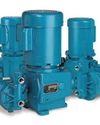
Chemical Engineering World
Sizing and Selecting the proper Metering Pump
In process application, large amounts of chemicals are used during daily operations and the volumes of chemicals are large and very precise, with exact amounts delivered according to strict injection schedules. Thus the pressures - from very high to very low – for injecting the chemicals should be governed precisely. Metering pumps have—whether mechanically, hydraulically or electronically actuated—raised to the fore as a technology of first choice for the injection of chemicals in processing and agricultural applications, but within the realm of metering pumps there are many different styles and modes of operation. The article explains the different metering-pump technologies and illustrates how the user should select the proper size and style depending on the injection application for which the pump will be tasked.
8 mins
August 2016
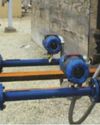
Chemical Engineering World
How Two Petrochemical Plants Improved Level And Flow Measurement
How Two Petrochemical Plants Improved Level And Flow Measurement
2 mins
May 2018
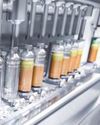
Chemical Engineering World
Just The Right Dose Of Intelligence
Nothing herein shall constitute an offer to sell, or a solicitation of an offer to buy. The ACOPOStrak product is not available for sale into the United States of America until September 2018.
1 mins
May 2018
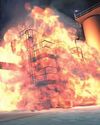
Chemical Engineering World
Hunting For Hazards
Leaving no stone unturned, no nook or corner unchecked, till we identify all hazards that threaten our installation or personnel or public
3 mins
May 2018
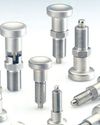
Chemical Engineering World
Indexing Plungers For Ultimate Demands In Terms Of Corrosion Resistance, Hygiene And Material Quality
Indexing Plungers For Ultimate Demands In Terms Of Corrosion Resistance, Hygiene And Material Quality
1 min
May 2018

Chemical Engineering World
ABB to Invest 100 Million in Global Innovation & Training Campus
ABB makes largest organic investment in industrial automation at home of B&R in Austria One year after announcing its acquisition of B&R (Bernecker + Rainer Industrie-Elektronik GmbH), ABB is to invest €100 million in Austria to build a state-of-the-art innovation and training campus at the home of B&R in Eggelsberg, Upper Austria. It is the largest organic investment in industrial automation in ABB’s more than 130-year history and lays the foundation for around 1,000 new high-tech jobs in Austria.
3 mins
April 2018

Chemical Engineering World
Secure & Seamless Communication With Powerlink & OPC UA
An OPC UA companion specification is now available for POWERLINK according to a joint announcement by the OPC Foundation and the Ethernet POWERLINK Standardization Group (EPSG). The companion specification describes how payload data is exchanged between POWERLINK and any OPC UA platform. The result is integrated communication from the sensor to the cloud – without any interfaces whatsoever.​​​​​​​
1 min
April 2018
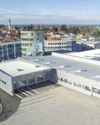
Chemical Engineering World
B&R Expands Gilgenberg Site
Automation specialist invests in production, office space and logistics.
1 mins
March 2018
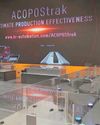
Chemical Engineering World
Unmatched Efficiency With High-Speed Diverters
B&R presents flexible transport system at Hannover Messe.
1 mins
March 2018

Chemical Engineering World
Digitalization Is Not An Option, But A Must
B&R India explores IIoT topics at 4th annual Innovation Day.
2 mins
March 2018
Translate
Change font size
